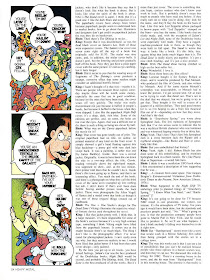.
Here's part two of my 1979 interview with Stephen King as it appeared in the February 1980 issue of Heavy Metal. Rereading, I recall the surrounding events, fore and aft. In retrospect, it's a peculiar narrative of close encounters with some friendly and a few unfriendly people. To read part one of the interview, go here and scroll down.
When I was teaching Boston art students in the 1970s, I would sometimes be broke during the summer months and seek out freelance work, which would usually come through at the end of the summer just when it was time to teach again.
In the summer of 1979, I was dining from the vending machines in the Harvard Architectural Center. The building was cool, and I'd stop there as I walked through the heat from Somerville to Harvard Square. One day someone phoned and told me that Stephen King was soon due to arrive in Boston on a publicity tour promoting The Dead Zone. Around this time, Publishers Weekly was running an ad touting King as "the bestselling author in the world".
I phoned the Viking Press publicist, got on the list and later that week I interviewed King at the Ritz across from the Boston Public Garden. Back in Somerville, I phoned the arts editor of The Boston Globe and told her that I had taped an interview with Stephen King. She said, "Who's that?" I said, "Er... I think he's like the bestselling author in the world." She said, "Perhaps you should speak to our book editor."
She transferred the call, and I spoke to the Globe book editor, described what I had, and he replied in a somewhat condescending manner: "Oh, we don't do author interviews." I hung up, contemplating the next move. I phoned American Film and spoke to film critic-editor Hollis Alpert (1916-2007), who asked, "Has he been involved in the filming of The Shining?" I said, "He went to England, and they showed him around the set." Alpert said, "In that case, we'll have one of our people write something." That was it. Three strikes, and I was out. It sure seemed incredible. I had an interview with the world's bestselling author, yet no one was interested. I put the tapes aside, planning another tasty stopover at the vending machines.
A few days later, Heavy Metal editor Ted White phoned, said he wanted me to do a monthly film column for the magazine, gave me a two-week deadline and asked what I was going to write. "How about Stephen King?" I said. I sat at the IBM Selectric and immediately began transcribing the tapes in order to generate 2,000 words for the January 1980 issue. No more vending machines. Even Harlan Ellison once wrote that Heavy Metal paid better than his other markets. The rate was 25¢ a word. This meant if I typed "a", "of", "to" and "the", I had already made one dollar.
For the second column installment, I had a bit more time, so I added another interview by phoning art director Jim Plumeri at Signet. I decided I needed to give Heavy Metal a photo of a topiary to illustrate the column's discussion of topiaries and mazes. Disney World had a topiary, so I phoned the Disney World publicist. He said, yes, a topiary was there, and yes, he had a photo, but no, he would not send it to me. I phoned the Massachusetts Horticultural Society and spoke to a woman who said, "Yes, we have several topiary photos." I said, "I'll be right over."
I arrived across from Symphony Hall at the corner of Massachusetts Avenue and Huntington Avenue where the Massachusetts Horticultural Society turned out to be nothing more than a single room of filing cabinets staffed by an attractive young woman, the only person there. She opened a file drawer and showed me a file folder with topiary photos. I said, "Wow! These are just what I was hoping for. Would it be possible to get copies?" She said, "You can have them. Take them." A refreshing attitude, I thought, but why? Was she getting her little bit of revenge for her Kafkaesque job situation, surrounded by filing cabinets and trapped alone in a room where few entered? Or was she simply leaving the job the next week? Or maybe she determined that 20 years might pass before anyone else would want a topiary photo. Whatever, it certainly counterbalanced the irritating refusal of the Disney publicist.
When I mailed in the second interview installment, Julie Simmons-Lynch read it and said to Ted White, "What's this? He only writes about Stephen King?"
After all that I went through to acquire a topiary picture, I was disappointed to see that Heavy Metal had reduced the photo, cropped it and covered it with a screen so dark that the image was obscured. A curious case where the photo credit is more visible than the photo, as you can see below.





No comments:
Post a Comment